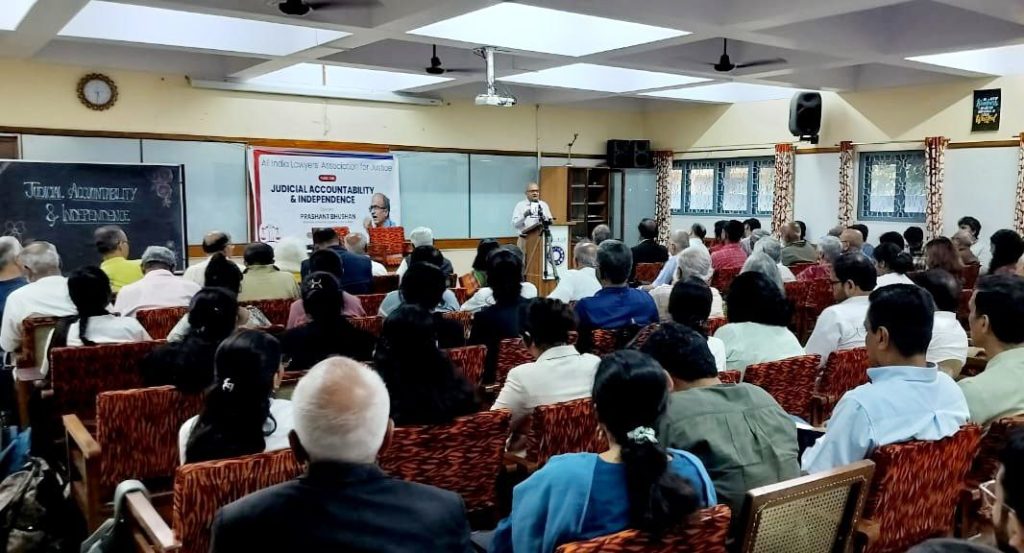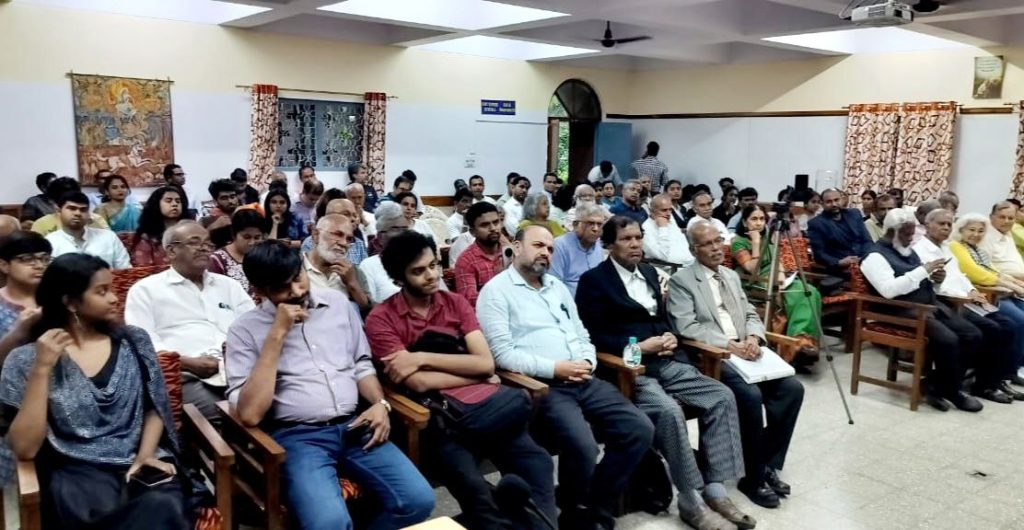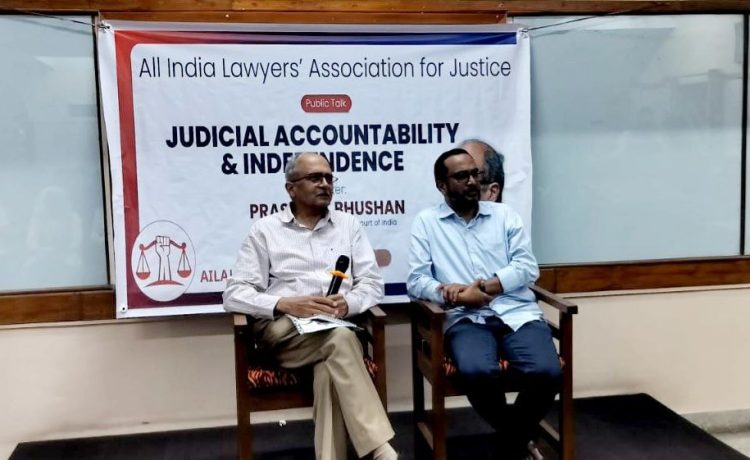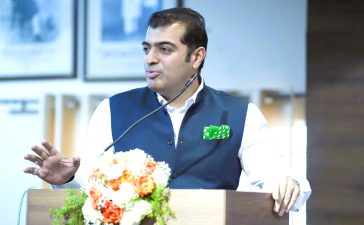✅ Summary of Story
In a public discussion hosted by the All India Lawyers’ Association for Justice (AILAJ) in Bengaluru, Advocate Prashant Bhushan addressed the growing crisis of judicial independence in India. He warned of the increasing compliance of judges with the executive, the lack of judicial accountability, and the ineffectiveness of impeachment procedures. He criticized the Collegium system’s erosion, post-retirement political appointments, and the judiciary’s failure to uphold citizens’ rights. He concluded by urging the people to build a mass movement to restore judicial integrity.
Judicial Independence Under Threat: Advocate Prashant Bhushan Calls for People’s Movement
ನ್ಯಾಯಾಂಗದ ಸ್ವತಂತ್ರತೆಗೆ ಬೆದರಿಕೆ: ಪ್ರಜಾಪ್ರಭುತ್ವ ಉಳಿಸಲು ಜನಾಂದೋಲನದ ಅಗತ್ಯವೆಂದು ಪ್ರಶಾಂತ್ ಭೂಷಣ್
Bengaluru | July 20, 2025 — Speaking at a public discussion organised by the All India Lawyers’ Association for Justice (AILAJ) in Bengaluru, senior advocate and activist Prashant Bhushan raised serious concerns about the weakening independence of India’s judiciary and called for a nationwide people’s movement to reclaim judicial accountability.
The event, held at Ashirwad Hall, was centered on the theme “Judicial Accountability and Independence”, where Bhushan delivered a detailed critique of the judiciary’s present functioning, highlighting its increasing submission to the executive and lack of public accountability.
The Role of Judiciary as Defined by the Constitution
At the outset, Prashant Bhushan reiterated the foundational principle laid out by the Constitution — that the judiciary must be independent of both the executive and the legislature. This independence is essential because the judiciary is entrusted with protecting the fundamental rights of citizens and ensuring that both the legislature and the executive function within the limits of the Constitution.
“If the government enjoys the power to select and appoint judges, they will choose judges aligned with their ideology. That’s why the Constitution left the appointment to the judiciary itself,” Bhushan said, referring to the Collegium System — the current method of judicial appointments in higher courts.
Erosion of Judicial Independence
Bhushan raised alarm over the increasing number of High Court and Supreme Court judges who, according to him, have failed to function independently in recent years, particularly under the current central government.
“In the last 10 years, we have witnessed a sharp decline in judicial independence. Many judges are doing exactly what the government wants, rather than protecting the rights of citizens,” he remarked.
He cited the prolonged incarceration of activists and government critics under draconian laws like sedition and UAPA, often without trial or bail, as examples of judicial failure. “Though the Supreme Court has laid down that ‘bail is the rule and jail is the exception’, this principle is routinely ignored by constitutional courts,” Bhushan added.

Judiciary’s Inaction in the Face of Atrocities
Bhushan pointed to a troubling pattern of judicial silence in cases of violence and discrimination against minorities, particularly in BJP-ruled states. He listed instances of bulldozing homes, mob lynchings, and other forms of communal targeting, stating that courts have often chosen to remain “unable or unwilling” to intervene.
Flaws in Judicial Accountability Mechanism
Bhushan also discussed the impeachment process for judges, describing it as impractical and ineffective. “You need signatures of 100 MPs from the Lok Sabha and 50 MPs from the Rajya Sabha to even initiate an impeachment motion. This has made it nearly impossible to remove a judge, no matter how serious the misconduct,” he explained.
“Till today, not a single judge has been successfully impeached,” he pointed out, underscoring the absence of any meaningful disciplinary mechanism for judges.
Electoral Bonds and Lack of Judicial Action
Another issue Bhushan raised was the Electoral Bonds case, where the Supreme Court found the system unconstitutional due to its lack of transparency. Despite this ruling, Bhushan noted that there has been no investigation into how massive sums of money — allegedly bribes in exchange for contracts and favors — flowed to political parties, especially the BJP.
“Even after proving the unconstitutionality of electoral bonds, there has been no accountability, no investigation, and no consequences,” he said.
Post-Retirement Appointments Undermining Integrity
Bhushan also warned about the culture of post-retirement appointments for judges, stating that this practice undermines judicial independence.
“As Arun Jaitley once said in Parliament — ‘pre-retirement judgments are influenced by post-retirement jobs’. This is happening today, with judges being offered Rajya Sabha seats or gubernatorial posts after delivering favorable judgments,” he said, citing specific examples.
Corruption and Lack of Accountability
Highlighting how unchecked judicial power and lack of oversight can lead to corruption, Bhushan said:
“When judges of the High Court and Supreme Court are not accountable to anyone, corruption thrives — and that suits the government, which prefers corrupt judges it can control.”
The Way Forward: A People’s Movement
In conclusion, Bhushan emphasized that the real sufferers of judicial failures are the common people, who rely on the courts for justice.
“The citizens are the true consumers of the judiciary. Unless people mobilise and demand accountability, nothing will change,” he said.
He called for a massive people’s movement to ensure judicial independence and accountability. “Only a sustained public struggle can compel the judiciary to reform and reclaim its constitutional role,” Bhushan asserted.

📜 Context & Background
India’s judiciary, once seen as the last bastion of democracy, is now under scrutiny for its perceived closeness to the executive. With concerns rising over political interference in judicial appointments, biased rulings, and lack of transparency, civil society and legal experts have called for urgent reforms. The discussion in Bengaluru gains importance amid recent Supreme Court rulings on electoral bonds and continued detention of activists under draconian laws. Prashant Bhushan, a long-standing advocate for judicial accountability, has been vocal about these issues, pushing for systemic changes through both legal and public campaigns.
🗣️ Key Quotes from Prashant Bhushan
-
“If the government appoints judges, they will appoint those who align with their ideology — not independent thinkers.”
-
“Judges today are failing to protect fundamental rights. Bail is the rule, but that rule is routinely ignored.”
-
“When judges are not accountable, corruption grows — and that’s exactly what the government wants.”
-
“The judiciary has turned a blind eye to atrocities against minorities. It is unwilling or unable to stop the injustice.”
-
“Arun Jaitley was right — pre-retirement judgments are affected by post-retirement jobs.”
-
“The only way to reclaim judicial independence is through a massive people’s movement.”
❓Q & A from the Event
Q: Why is judicial independence important in a democracy?
A: Because the judiciary is tasked with protecting citizens’ rights and ensuring that the executive and legislature follow the Constitution. Without independence, courts cannot fulfill this role.
Q: Is the Collegium system working as intended?
A: No. While the Collegium was meant to preserve judicial autonomy, it has become opaque and vulnerable to government pressure.
Q: What is wrong with the impeachment process?
A: It’s practically impossible. Requiring signatures from 100 Lok Sabha and 50 Rajya Sabha MPs makes it unworkable. No judge has ever been impeached successfully.
Q: Has the judiciary failed in protecting civil liberties in recent years?
A: Yes. Activists languish in jail without trial or bail, and courts are often silent in the face of human rights violations.
Q: What’s the solution?
A: A large-scale people’s movement is needed to demand judicial accountability and reform.
📌 Fact Sheet: Judicial Accountability & Independence
(Based on Advocate Prashant Bhushan’s speech, Bengaluru)
⚖️ Why Judicial Independence Matters
-
The judiciary is the guardian of the Constitution and the protector of fundamental rights.
-
It must remain independent from both the executive (government) and the legislature (Parliament).
-
Judges of the High Court and Supreme Court are given immunity from government disciplinary action to preserve this independence.
🚨 Key Concerns Highlighted
-
Declining Independence: Many judges in recent years have acted in alignment with the government, compromising their role as neutral arbiters.
-
Failure to Protect Rights: Citizens, activists, and dissenters continue to languish in jail under sedition and anti-terror laws, often denied bail.
-
Ignoring Minority Atrocities: Courts remain silent or inactive on issues like bulldozing homes, mob lynchings, and discrimination.
-
Impractical Impeachment Process: Requires 100 MPs (Lok Sabha) + 50 MPs (Rajya Sabha) signatures — so far, no judge has ever been impeached.
-
Electoral Bonds Case: Declared unconstitutional, but no accountability or investigations have followed.
-
Post-Retirement Appointments: Judges accepting political posts after retirement compromise judicial independence.
📝 Famous Quote Highlighted
-
Arun Jaitley in Parliament (quoted by Bhushan):
“Pre-retirement judgments are influenced by post-retirement jobs.”
📊 Snapshot of Issues
-
Judicial Appointments: Controlled by the Collegium system but influenced by government pressure.
-
Bail Rule Ignored: Supreme Court’s own principle — “Bail is the rule, jail is the exception” — is being violated.
-
Electoral Bonds: BJP received more than 50% of donations, raising questions of quid pro quo.
-
Accountability Gap: No robust mechanism exists to discipline corrupt or biased judges.
💡 Proposed Solution
-
People’s Movement: Only strong citizen mobilization can ensure that the judiciary remains accountable and independent.
-
Transparency & Reform: Judicial appointments, conduct, and accountability must be subject to public scrutiny.
🔖 Takeaway
The real sufferers of judicial compromise are ordinary citizens, as they are the primary consumers of justice. Without accountability, the judiciary risks becoming an extension of the government rather than a check on its power.
![]()











